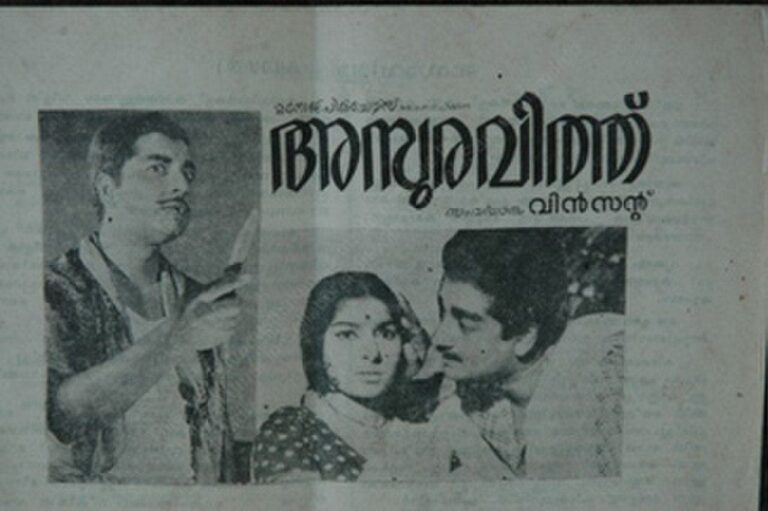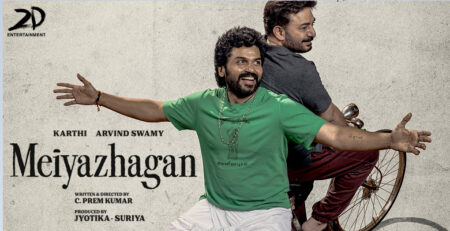In this part of the series, MT: Malayalam’s Talisman, we dissect three films that formed MT’s political trilogy.

Film: Asuravithu (The Demon Seed), 1968
Cast: Prem Nazir, Sharada, P. J Anthony, Sankaradi, Adoor Bhasi
Director: A Vincent
Asuravithu saw MT really stepping out of his comfort zone. Iruttinte Athmavuwas unusual, but it was still restricted to a family. This time, MT expanded his commentary to society as a whole — with some unexpected twists and turns. It helped that he had an acclaimed novel to turn to.
MT likes to stick to the milieu he knows best. So we have yet another Nair family. The youngest son Govindan Kutty (Prem Nazir) tries to take care of his mother and elder sister (Kaviyoor Ponnamma) as the times get tougher. His eldest sister Madhavi is married to a rich miser Shekharan Kutty (Sankaradi). Meenakshi (Sharada), a penniless distant relative, stays with them. Govindan Kutty’s close friend is Kunjarakkar (Anthony), a Muslim. When the normally stand-offish Shekharan Kutty comes with a proposal to marry off Govindan Kutty to Meenakshi, it sets into motion a series of events that sends the village spiralling down into a communal bonfire.
It was with Asuravithu that MT started breaking the shackles of populism. There are many themes running concurrently – the disintegration of a proud family, atrocities against the underprivileged, the sense of entitlement money brings, communal tensions that can be set ablaze at the slightest spark, the deadly equaliser that was cholera, male privileges and mansplaining of a woman’s virtue.
Nazir is better in this movie than in Iruttinte Athmavu. He does bring some subtlety, though he cannot completely throw away his film star persona. Sharada is again wasted in a ‘bit’ role. When did Malayalam cinema realise the powerhouse that was in their midst? Sankaradi, once again, sparkles in a serious role. Unrecognisable from his comedy turns.
It is essential that the present-day audience realise that there once was a force of nature striding through Malayalam movies and his name was PJ Antony. Once again, in a sea of theatrics, he brings forth an acting masterclass rooted in realism and without a false note.
Asuravithu has multiple plot holes. Whether it is poor editing or MT unable to bring all the riches of the novel into a two-hour screenplay is not clear. There are multiple threads that could have meant much more. At the same time, I am quite sure there was nothing like Asuravithu in theatres. It even has a religious conversion, for god’s sake! Something we can’t imagine hitting theatres without a controversy today.
Apparently, Murappennu, Iruttinte Athmavu and Asuravithu are known as MT’s political trilogy. And these films, which primarily dealt with social issues, did attract crowds. Maybe it was a reflection of an educated audience, maybe they were themes that struck a chord, maybe the man’s genius lay in his accessibility. A very long love affair began with the Malayali and MT, which still continues.
Film: Olavum Theeravum (Waves and the Shore), 1970
Cast: Madhu, Usha Nandini, Philomina, Jose Prakash, Nellikode Bhaskaran
Director: PN Menon
Olavum Theeravum – now a cult of some repute thanks to Menon’s direction and the sensibilities he heralded – is widely credited with introducing an art cinema aesthetic to Malayalam movies. We can spend hours debating whether that is a good thing or bad. Instead, let us just stick to the movie.
First off, MT finally gets out of his wheelhouse. Adapted from his short story of the same name, the movie brings us up and close to a Muslim way of life. Bapputty (Madhu), a homeless timber worker, brings the news of his friend Abdu’s (Bhaskaran) passing to the latter’s mother (Philomina) and sister Nabeesa (Usha Nandini). Abdu had not been home for many years. He had left after he found out that his widowed mother was bringing them up by having gentleman callers. Bapputty’s initial disdain changes as he becomes closer to the family, especially Nabeesa. He goes to the hills to earn some money logging. Unfortunately, this was also the time Kunjali (Jose Prakash), a son of the soil, returned after making his fortune. Will the love story have a happy ending?
Madhu puts in an understated performance. I never bought into the whole Bhavabhinaya Chakravarthy (Emperor of Acting through Emoting) moniker, but he does acquit himself honourably. Usha Nandini proves an able foil, even though her role is rather limited. Philomina excels in the role of the mother. Nellikode Bhaskaran is there for all five minutes but leaves a lasting impression. After acting in small roles for almost a decade, Jose Prakash started a storied journey as a villain with this film. It also cemented an unfortunate truism in Malayalam movies – if Jose Prakash or Balan K. Nair entered the screen, it was a precursor to something bad happening to the heroine.
Olavum Theeravum is not a small budget movie for the time. Almost all scenes are shot outdoors and there is some impressive cinematography by Mankada Ravi Varma. The transport of logs on the river during heavy rain requires special mention. The songs do not detract from the realistic feel as it is mostly in the background.
While the pace is slow, it does not drag. The climactic fight is hilarious until you realise they are going for the opposite of a choreographed stunt. If I have a bone to pick, it is how the movie ends. While the short story would have made it more convincing, here it sounds false. Or maybe it does to someone in a different generation.
Film: Nizhalattam (Shadow Play), 1970
Cast: Prem Nazir, Sheela, Thikkurissi Sukumaran Nair, Sankaradi, Kaviyoor Ponnamma, Sudheer, Balan K. Nair
Director: A Vincent
Generations gone by would always teach their young about the pitfalls of extravagance. How money could disappear as easily as the paper it was printed on. As an adult, your worth is measured by what you save, not what you earn. Nizhalattam is a moral fable on wealth – how it is created and preserved, and how it is squandered.
Karunakaran (Thikkurissi) is a rich businessman. He is a miser who forgot his humble roots. His family consists of the hypochondriac wife (Ponnamma) and his elder son Ravi (Nazir). The younger son Dasan (Sudheer) had left home years before, following a verbal duel with his father. Karunakaran rules over his kingdom with an iron hand, watching over every rupee. Ravi is scared of his father but still worships him.
Karunakaran’s sudden demise meant that Ravi moved into the throne. The youngster who was never given any responsibility when his father was alive suddenly had to take care of a small empire. When his brother Dasan came back, Ravi found a whipping boy, like he himself had been, when their father was alive. The erosion of wealth was faster than anyone expected.
Nizhalattam doesn’t hide its intentions. It wants to educate you. About family and its pretence, about friendships and its flimsiness, about decadence and its swift end. But it is not very successful. What was supposed to be a study of excess turns out to be an exercise in excess. Everything does not come together as you expect in an MT screenplay.
That is not to say it doesn’t have any surprises up its sleeve. The standout is the depth of the main characters. There are no good guys. Everyone has their own flaws. Thikkurissi has a short screen time but he is able to make a lasting impression, both on the audience and the other characters. Ponnamma, who usually plays the loving and silently suffering mother, gets a chance to bring a little grey to her character. That she is playing mother to someone who is actually 20 years older than her is just celluloid magic! Sudheer plays the younger brother. He does a decent job. Imagine my surprise when I found that he had acted in over 100 movies!
Sheela has a small role as Shantha, Ravi’s wife. She does get to have one outburst, which is basically MT screaming at us that everyone on screen was at fault. Tamil actress Bhanumathi plays the supporting heroine.
Nazir surprises. The Evergreen Hero takes a role that has no redeeming qualities and gives it his all. He goes so against type that I am beginning to feel that my generation never gave him his due. He was not just a pretty boy as many of us assumed. Unfortunately, his mannerisms, including one where he randomly elevates himself on his toes will be cringe-worthy to modern audiences.
Nizhalattam could have done with a lot of editing. To reach the two-and-a-half-hour runtime, which was customary in Indian films those days, they added in a bunch of songs. They are from the fabled Vayalar-Devarajan team. The lyrics are sheer poetry and apt to the story. But they do not carry the film forward. The last half-hour is a literal play in shadows. But, all in all, Nizhalattam is an opportunity missed.
But I am perfectly happy Nizhalattam exists because of a debutante. It was the first time Malayalis saw on the screen a man who – believe it or not – had a previous job as a body double for Bollywood legend Dev Anand. Nizhalattam features a truly unremarkable performance by someone who proved incapable of doing that again. A mildly negative role for someone who, with a leer and a sneer, redefined villainy in Malayalam cinema. His name: Balan K Nair.
Write to us: [email protected].
Read Part 1 of the series here.




